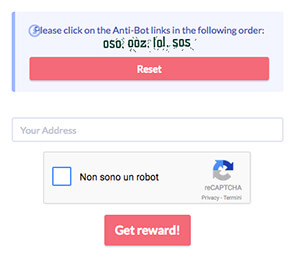What are Bitcoin Faucets

When it comes to Bitcoin faucets and cryptocurrencies in general, we mean those sites, which as translation from English suggests, serve as dripping "faucets" of virtual currency.
They are almost all in English, although very intuitive, and can present themselves as a single page within a larger site, or as a monothematic portal with the specific function of rewarding their users on request of some fractions of cryptocurrency.
In addition to dispensing virtual coins for free, faucets often have some sections where they describe the currency they are distributing and most often present themselves with a substantial number of banners and advertising popups, which the user must learn to dodge manually or with the help of appropriate browser plugins.
How faucets work: guide

The essential structure of a faucet consists of a field, where you enter the address of your wallet or the email account of a microwallet (as in the case of FaucetPay) and a button to make the digital currency claim. Generally, then between the address field and the claim button is inserted a Captcha, a reCaptcha or a SolveMedia: these are very widespread systems that serve to avoid automatic claims.
The operation of faucets is very simple: it is usually enough to fill in your field with the address of your Bitcoin wallet or other crypto currency (a string of type 1HwsQPCNsrJoMHMVKYr3tkG6nUALkAMW7t), then solve the Captcha (or equivalent) and click on the button with "Claim", "Get Reward" or other similar phrases written on it.
Sometimes the button under the Captcha has the words "Continue" or other equivalent: this means that the digital currency complaint process involves more than one step. At the click you are then directed to a second page or even a third page, which usually contain an Antibot or a shortlink. The first is a system with the same function as a Captcha, that is, to verify that it is a human and not a bot to claim: typically, a series of letters, numbers or simple mathematical expressions are given to which correspond links scattered on the page to be clicked in the requested order. The short-url page usually contains, in addition to the conspicuous advertisement, another Captcha to be solved and a few seconds to wait to be redirected back to the faucet, where you can finally claim your satoshi. A reload of the site and a message of accreditation completes the whole procedure.
When the faucet is connected to a microwallet, such as FaucetPay, for example, accreditation takes place instantly, other times it accumulates in the balance of your account waiting to reach the payout, as a result of which you can withdraw. In the latter case, the faucet can request a short registration or recognition can only take place by email or the address of your wallet.
Why do faucets exist? How do they earn?
Faucets have been on the web for several years and their historical function has always been to make known the world of cryptocurrencies (initially bitcoin only) directly through the provision of the same: this allowed the user to touch this phenomenon because, personally holding digital currency, he learned to use wallets and how transactions worked. Faucets therefore played, particularly in the early days, a fundamental role in the spread of Bitcoin and early cryptocurrencies.
Today, although they still perform this function, especially for the new altcoins, they are mostly carried out for the primary purpose of profiting from the advertisements on their pages. Through, therefore, the free provision of cryptocurrencies, faucet admins receive views and clicks on the various banners and popups in return, earning a profit typically paid in traditional currencies by advertisers.
This, in fact, is why in the claiming process there are more and more additional steps, redirects to external sites (shorturl) or short countdowns before allowing the click on the various claiming buttons, that is, precisely to keep the user on the crypto dispenser site as much as possible, increasing the chances of clicks and display of advertising.
Advantages and disadvantages of faucets

Cryptocurrency faucets are often criticized on the Web: it is obvious that they, although they give virtual coins with real value free of charge, also have not only advantages, but also disadvantages.
The harshest criticism states that faucets make no sense, as they give only a few thousandths of euros per claim: it would therefore only be wasted time for the user, who should instead learn more about the technology underlying crypto.
This is partly true, but it must also be said that, although few, it is still a gift, in the face of minimal activity. In addition, faucets must always be approached from a future perspective, taking into account the fact that the current value of their rewards can grow in the coming years.
By example, if today the Ethereum faucets give every 5 minutes about 150 Gwei, which corresponds to about 0.001 euros, it could happen that in a few years, by raising this coin in price, that small portion of Ether can be worth much more. This has already happened in the past with Bitcoin, when online faucets gave thousands of satoshi in a few claims, which today, with its current value, would appeal to many.
Another objection to those who consider faucets only wasted time is the fact that they give users the opportunity to own cryptocurrencies in a simple way and without any investment or risk. This allows you to fully experience the phenomenon of digital currencies, directly testing online wallets, transactions and exchanges on exchanges.
Although few, those handfuls of cryptocurrencies then often push the user to want to deepen even more what is actually possessed and what are the technological possibilities of the projects that are behind it.
Faucets are therefore an easy and direct way of coming into contact with the phenomenon of cryptocurrencies, often urging the study of their mechanisms.
Another criticism that is levelled at these cryptocurrencies dispensing sites is that they are too chock-full of invasive advertisements and sometimes even secretly mining, illicitly exploiting the computational power of the user. This is due to the obvious attempt to generate profit from the administrator of a faucet in the face of the free handout of crypto coins.
However, today there are many ways to defend against invasive faucet advertisements, such as browser extensions such as AdBlock or various anti-popups, as well as against occult mining you can use plugins such as No-Coin.
Finally, to cope with all the possible disadvantages in the use of online rubies to earn free cryptocurrencies and without too much hassle, the best thing is to make an appropriate selection of the best cryptocurrency faucet, such as those proposed on this site: this allows you to optimize the claiming, parameterizing the amount of rewards, the advertising to avoid, the steps to overcome for the request , as well as, more importantly, one's time to devote to it.
